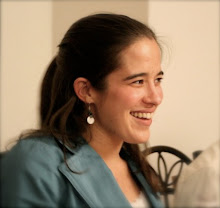It was my first time seeing her, and a long conversation about what to do with her conflicting feelings over an unplanned pregnancy was not what I expected to encounter upon entering the room. She'd been pregnant half a dozen times before, but a combination of repeated first-trimester miscarriages and third-trimester losses meant she had only two living children. Just hearing her story of waking up several weeks prior to full-term in a pool of blood and then delivering a dead baby was enough to make me want to cry for her. A history of childhood abuse and adult rape only increased my admiration for the courage that made her able to continue dreaming for her future.
But this was an office visit with limited time, so I avoided tears on her behalf as I heard her stories and brought the conversation back to the issue at hand - her current pregnancy. Due to serious health problems and a history of complicated, high-risk pregnancies, she was unsure that she should carry this pregnancy if she wanted her living children to have a mother with whom to grow up. She cried to me - a near stranger - over her agony of deciding she must end the pregnancy. We spoke of options, and I affirmed our support for her medically and emotionally whichever option she chose.
The encounter reminded me of the confusing way my roles and identities intersect as I start the practice of medicine. I believe strongly that my primary interface in any interaction is that of one human being encountering another. But as she spoke of the recommendations health care workers have made to her in the past and of her feeling that the only responsible path was to end the pregnancy, I was reminded that as a doctor I may still be a human being, but I am also more alongside that.
I am a person with power in this relationship. I feel it weigh on my shoulders as patients ask me questions. It is power to influence. Power to persuade or recommend. Power to change her mind... Or power to give away to empower another.
How do I deal responsibly with that power? How do I balance my own values as a human being with the inequality of our status in this relationship and my own deep desire not to push my beliefs on someone else? How do I reckon with the fact that I as a human being am accountable for my own choice to influence - or not - in one direction or another while also seeking to let my patient be responsible for her own choices? How do we ever persuade wholeheartedly while avoiding manipulation? How do I take off this cloak of authority and seek to relate on a level as one person, one woman, to another?
All of these questions hung on my heart, grabbing my attention and shaping the way I spoke and responded as I spoke with my patient. And all of them remained as I wrote my note on our visit together through my tears. I shared this story at a medical conference seminar on reflective writing recently. One of the comments I got in response was from a fellow believer: "You very much nailed the tension of living out our faith in a power relationship but love always wins."
Love always wins. What does that look like? I'm not sure in the day-to-day whether I make the right choices. But it is a relief to be reminded that at the end of the day - whether I agree or disagree with my patients' choices, whether I have complete peace with what I said and left unsaid - if I have loved them, I have done what is pleasing to God. And all the best advice and soundest options counseling without love would be worth nothing. Now for learning the wisdom of figuring out when love looks like emotional support and when it requires hard conversations...or maybe it's both.
Subscribe to:
Post Comments (Atom)


No comments:
Post a Comment
Note: Only a member of this blog may post a comment.